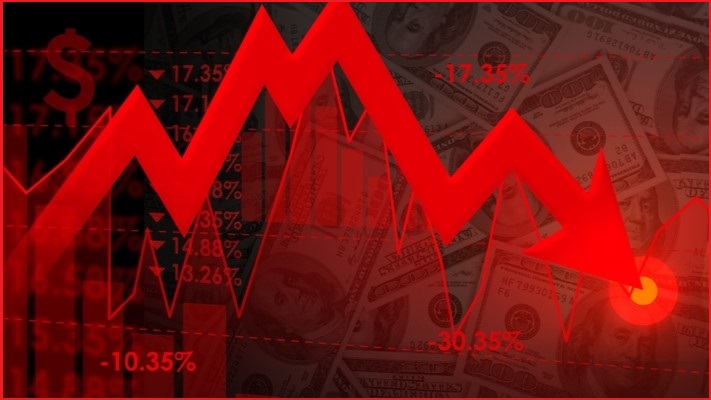Tech companies are copping the brunt of an alarming, global dip in stocks – with leading brands such as Apple, Nvidia, Nintendo and Google’s parent company Alphabet suffering tremendous losses amid fears of a looming US recession.
On Monday, Japanese stocks suffered their biggest daily loss since 1987 as the Nikkei 225 – an index of leading stocks in Tokyo – suffered a 12 per cent plunge.
This catastrophic dip not only sparked fears for Japan’s economy, but led to a spate of wider global losses which are still driving widespread panic-trades today.
The US’ leading indexes suffered major losses overnight, both Japan and South Korea repeatedly halted trading to prevent panic selling, while Australian stocks closed Monday with losses of more than $100 billion, signalling the worst two-day decline since late 2022.
Much of this mayhem has been attributed to widespread fears of a looming US recession – which grew last week as the US Federal Reserve indicated interest rates would soon need to be cut.
These fears were compounded on Friday after a July jobs report from the US Labor Department showed the unemployment rate had risen to 4.3 per cent – the highest rate in nearly three years.
While still a relatively low unemployment rate, global finance firm Goldman Sachs soon after raised its US recession odds from 15 percent to 25.
The unemployment figures come off the back of Big Tech’s long-running streak of major layoffs – which has seen the likes of PayPal, Meta, Microsoft, Google, and Amazon all slash staff in recent years.
Furthermore, last week saw chipmaker Intel serve as an early indicator of US market troubles after it fell 26 per cent in just one day– a drop which came after the company announced Thursday it was cutting 15,000 jobs from its workforce.
And while the spotlight is on fears of a US recession, Japan’s stock plunge was undoubtedly compounded by mixed earnings among some of its leading tech stocks.
Iconic games publisher and Nikkei 225 stock Nintendo recently reported massive year-on-year downturn across its entire business before suffering a reported 15 per cent drop in stocks yesterday, while fellow Japanese companies Sony and Capcom saw similar profit dips before yesterday’s fall in stocks.
One of the most impacted stocks was chipmaker Tokyo Electron, which dived some 18.5 per cent, followed by steep losses for automotive companies Toyota, Honda and Mitsubishi.
Meanwhile, Warren Buffet (the world's tenth richest person), dumped 56 per cent of Apple stock from holding company Berkshire Hathaway in the first six months of 2024 – growing a cash stockpile as investors speculate on whether the move signals a coming recession.
Is the AI-hype bubble popping?
After the Nikkei 225 crash, US markets opened to a flurry of trades which left the tech-heavy Nasdaq Composite down some 3.4 per cent.
Standard and Poor's 500 – an index tracking the performance of 500 of the largest companies listed on stock exchanges in the US – lost a reported $1.3 trillion in market value, while the Dow, another index tracking Amazon, Apple, Microsoft and other prominent US-listed companies, landed its worst day since 2022 by sinking 2.6 per cent.
These losses come after a week of already-rough earnings from Big Tech – which ignited serious doubts over the longevity of the recent boom in artificial intelligence investment.
Information Age and major news publications such as CNN, The Sydney Morning Herald and ABC News have all recently touched on fears of a turbulent AI investment ‘bubble’, while tech writer Ed Zitron suggested Wall Street may have noticed the ambitions of generative AI will require “massive upfront investments” and “the payoff may not actually be there” for a long time to come.
“These companies — while still making over $10 billion dollars in profit in the last quarter alone — have also spent an absolute shit ton of money on infrastructure to capture the ‘demand’ for cloud services from generative AI,” said Zitron.
“However, none of them seem to actually be making that much money from the thing they’re investing in.”
Of the ‘Magnificent Seven’ (a catchy title describing strong tech performers including Apple, Microsoft, Alphabet, Amazon, Meta and Tesla), graphics card maker Nvidia led losses at a huge 7.3 per cent.
Nvidia – whose graphics processing units play a central role in enabling AI technologies – has recently skyrocketed to become the world’s most valuable company after tripling its stock in less than a year.
Its Monday night plunge was accompanied by losses at other key players in the AI scene, including leading semiconductor manufacturer Taiwan Semiconductor, server manufacturer Super Micro Computer, and Google parent company Alphabet.
“It’s not a recession, it’s a long-overdue correction for all the AI hype and bullshit the markets have been swallowing for 18+ months,” said X user georgiaisaverb.
Founder of AI firm Geometric Intelligence, Gary Marcus, said while the US’ day of trading was “a crazy day in tech” and could “turn out to be a turning point”, he wasn’t ready to write off the growth of generative AI.
“I won’t declare victory on my predictions of the deflation of GenAI bubble yet,” said Marcus.
“All kinds of things can drive the market, and it ain’t over yet.”
Meanwhile, cryptocurrency crumbled during the frenzied stock market of Monday, with Bitcoin falling some 15 per cent in 24 hours, alongside a 22 per cent plunge for Ether.
Both currencies have since bounced back, but remain down from the weekend in excess of 10 per cent.
“296,163 crypto traders have been liquidated in the last 24 hours, with the total liquidations at $1.21 billion,” wrote financial data platform Unusual Whales.
Meanwhile, the Australian Financial Review reports the Australian Stock Exchange is currently swinging “between gains and losses” after opening to less losses than expected following its Monday dive.










